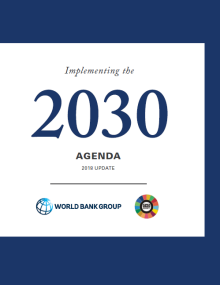World Bank Group 2018 Update on Data, Finance, and Implementation
By Mahmoud Mohieldin

To overcome these challenges, all stakeholders—governments, the private sector, civil society, international organizations, and citizens around the world—must bring to bear our collective knowledge, data, financing, and implementation experience.
The World Bank Group is committed to achieving the SDGs, which are fully aligned with our twin goals to end extreme poverty and build shared prosperity in a sustainable manner—and we are devoting the full measure of our capital and knowledge to reach them.
Recently, we unveiled the Second Edition of “Implementing the 2030 Agenda,” which outlines the World Bank Group’s broad commitment and actions toward achieving the Sustainable Development Goals (SDGs). The publication shows that the SDGs thread through all of our work, providing greater focus, while urging renewed collaboration with our partners in civil society, the public and private sectors, as well as international and philanthropic organizations.
Features of the 2018 Update
In this update of Implementing the 2030 Agenda, you will see many examples of our impact in projects at the local, national, regional, and global levels -- and in the full range of sectors, including education, health, infrastructure, technology, climate change, gender equality, business development, energy, and many others.
You will read about how the World Bank Group brings its unparalleled knowledge, convening power, and financial leverage to bear on development challenges, working in countries at peace and in conflict, with per capita incomes that are modest or very low.
And you will hear about our deep experience implementing projects to address the world’s toughest development challenges, such as climate change, humanitarian crises, inequality, economic shocks, or technological disruption—in each case seeking to protect the poor and vulnerable.
Since the World Bank Group’s thematic and sectoral global practices line up closely with the 17 SDGs, these units have provided the substantive contributions for each of those chapters, while noting cross-sectoral connections to other SDGs. Each of these chapters provides a deeper look at how our implementation efforts translate into results on the ground at the country level as well contribute to global public goods.
A section is included on how the World Bank Group uses data to improve the effectiveness of our joint efforts with partners to meet the SDG targets and indicators. Also described is our work in addressing gaps in the production and use of data needed to assess progress at the country and global levels.
In addition, this update includes a summary of the World Bank Group’s work in supporting the Financing for Development Agenda, through IDA, our fund for the poorest nations; IBRD, which serves middle-income countries; IFC, the Bank Group’s private sector arm; and MIGA, our insurance arm. The financing summary also covers policy measures to support domestic resource mobilization; the World Bank Group’s new approach to mobilize private sector capital, Maximizing Finance for Development; and a variety of other innovative efforts to bring additional capital into play to achieve the SDGs.
Also included are descriptions of a number of World Bank Group initiatives—at the country, regional, and global levels—that are designed to support our work on the SDGs in operations, corporate engagement, and advocacy.
We can achieve the 2030 Agenda, but it will take much more urgency and focus than we have delivered so far. We all have an obligation to take decisive action on a broad swath of deliverables for the SDGs—and to do it smartly.
Key Themes and Initiatives

In addition, World Bank Group’s new Partnership Fund for the Sustainable Development Goals will respond to the growing need to support catalytic partnership initiatives to drive achievement of SDG17. And while the Ideas for Action competition is in its fourth year and drawing over 2,000 innovative ideas on financing and implementing the SDGs, the new SDGs and Her initiative has received over 1,200 entries in its first year, inviting women microentrepreneurs to share their stories about how their businesses are helping achieve the SDGs.
This update is not exhaustive, rather it is a representative sample of our impact, in working with our country partners and many other stakeholders. Yet throughout, it shows the World Bank Group’s deep commitment to protect people and the planet, and to leave no one behind.
Mahmoud Mohieldin was the World Bank Group Senior Vice President for the 2030 Agenda, UN Relations and Partnerships.


